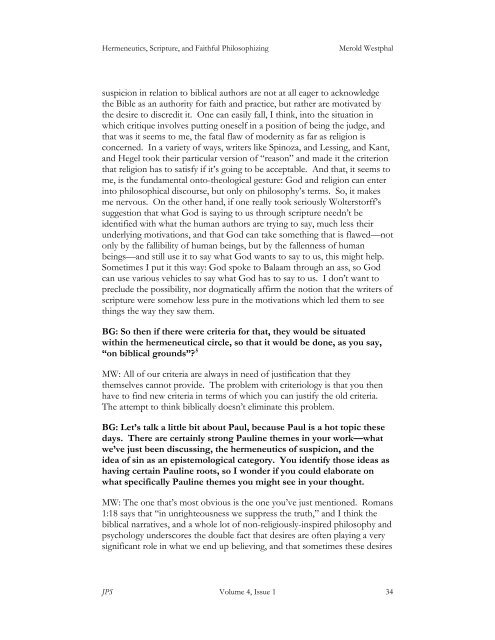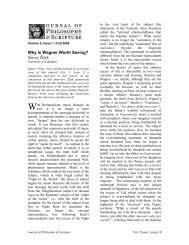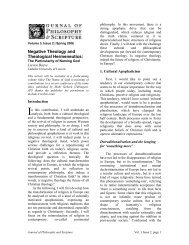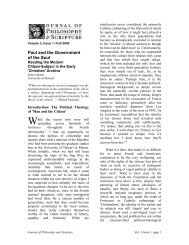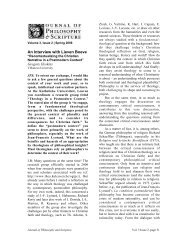interview with Merold Westphal - Journal of Philosophy and Scripture
interview with Merold Westphal - Journal of Philosophy and Scripture
interview with Merold Westphal - Journal of Philosophy and Scripture
Create successful ePaper yourself
Turn your PDF publications into a flip-book with our unique Google optimized e-Paper software.
Hermeneutics, <strong>Scripture</strong>, <strong>and</strong> Faithful Philosophizing <strong>Merold</strong> <strong>Westphal</strong><br />
suspicion in relation to biblical authors are not at all eager to acknowledge<br />
the Bible as an authority for faith <strong>and</strong> practice, but rather are motivated by<br />
the desire to discredit it. One can easily fall, I think, into the situation in<br />
which critique involves putting oneself in a position <strong>of</strong> being the judge, <strong>and</strong><br />
that was it seems to me, the fatal flaw <strong>of</strong> modernity as far as religion is<br />
concerned. In a variety <strong>of</strong> ways, writers like Spinoza, <strong>and</strong> Lessing, <strong>and</strong> Kant,<br />
<strong>and</strong> Hegel took their particular version <strong>of</strong> “reason” <strong>and</strong> made it the criterion<br />
that religion has to satisfy if it’s going to be acceptable. And that, it seems to<br />
me, is the fundamental onto-theological gesture: God <strong>and</strong> religion can enter<br />
into philosophical discourse, but only on philosophy’s terms. So, it makes<br />
me nervous. On the other h<strong>and</strong>, if one really took seriously Wolterstorff’s<br />
suggestion that what God is saying to us through scripture needn’t be<br />
identified <strong>with</strong> what the human authors are trying to say, much less their<br />
underlying motivations, <strong>and</strong> that God can take something that is flawed—not<br />
only by the fallibility <strong>of</strong> human beings, but by the fallenness <strong>of</strong> human<br />
beings—<strong>and</strong> still use it to say what God wants to say to us, this might help.<br />
Sometimes I put it this way: God spoke to Balaam through an ass, so God<br />
can use various vehicles to say what God has to say to us. I don’t want to<br />
preclude the possibility, nor dogmatically affirm the notion that the writers <strong>of</strong><br />
scripture were somehow less pure in the motivations which led them to see<br />
things the way they saw them.<br />
BG: So then if there were criteria for that, they would be situated<br />
<strong>with</strong>in the hermeneutical circle, so that it would be done, as you say,<br />
“on biblical grounds”? 5<br />
MW: All <strong>of</strong> our criteria are always in need <strong>of</strong> justification that they<br />
themselves cannot provide. The problem <strong>with</strong> criteriology is that you then<br />
have to find new criteria in terms <strong>of</strong> which you can justify the old criteria.<br />
The attempt to think biblically doesn’t eliminate this problem.<br />
BG: Let’s talk a little bit about Paul, because Paul is a hot topic these<br />
days. There are certainly strong Pauline themes in your work—what<br />
we’ve just been discussing, the hermeneutics <strong>of</strong> suspicion, <strong>and</strong> the<br />
idea <strong>of</strong> sin as an epistemological category. You identify those ideas as<br />
having certain Pauline roots, so I wonder if you could elaborate on<br />
what specifically Pauline themes you might see in your thought.<br />
MW: The one that’s most obvious is the one you’ve just mentioned. Romans<br />
1:18 says that “in unrighteousness we suppress the truth,” <strong>and</strong> I think the<br />
biblical narratives, <strong>and</strong> a whole lot <strong>of</strong> non-religiously-inspired philosophy <strong>and</strong><br />
psychology underscores the double fact that desires are <strong>of</strong>ten playing a very<br />
significant role in what we end up believing, <strong>and</strong> that sometimes these desires<br />
JPS Volume 4, Issue 1 34


